2018 in Review – What We Were Up To
Dear Colleagues,
Greetings from a sunny and warm Lagos! This is the first of our quarterly bulletins as we look forward to keeping you abreast with our activities and share our plans for the future. And what better way to look at the future than to start with our immediate past!
2018 was a year of growth and changes for us at TIERs. We moved to a new office in Lagos, expanded the size of our team to add a communications officer and a safety and security director. We also changed leadership as Olumide Makanjuola transitioned from his role as Executive Director and passed on the mantle to the first female Executive Director.
Leadership
In March 2018, Olumide Makanjuola stepped down from his role as Executive Director of The Initiative for Equal Rights. Olumide who was with TIERs for 12 years, serving as the Executive Director for almost six years, stepped down from his role to take a personal break before moving on to other ventures. Throughout his time as the Executive Director, he carried out his duties in a dedicated manner, churning out transformative work. In June, Xeenarh Mohammed was appointed as the new Executive Director to take over from our Director of Human Rights and Advocacy, Omolara Oriye, who had stepped in as interim director at the time. Xeenarh is a lawyer, activist, community organizer and holistic security trainer with over a decade of experience working on human rights issues across sectors within and outside Nigeria.
Human Rights and Advocacy
Under our Human Rights and Advocacy work, we carried out monitoring and documentation of human rights violations that were reported to us through community members and partners in the various parts of Nigeria. We also provided pro-bono legal aid service to people who experienced violation and discrimination based on their real or perceived sexual orientation and gender identity.
- All through 2018, we continued our monthly documentation of SOGIE based human rights violations. This plays a huge role in our evidence-based activism. The goal is to create a reference not only for the media. We can only approach the Police force, the National Human Rights Commission and the Court of law with proper evidence of these violations.
- In February, we held a Human Rights Strategy Meeting in partnership with other Human Rights NGOs to advocate for the Human Rights and Sexual Health and Rights of sexual minorities across Nigeria. At this meeting, we identified and mapped relevant stakeholders and partners to interact and work with. We also held further meetings in February and in November to evaluate the human rights situation of sex workers and sexual minorities.
- As part of our movement building and capacity strengthening activities, we held three legal surgeries in February, July, and November for strategic litigation on sexual rights in Nigeria. We had lawyers and representatives of other Human Rights Organizations in attendance and worked on building the capacity of lawyers and other allies.
- In July, we collaborated with Education as a Vaccine (EVA Nigeria), a non-profit organization that works to improve the health and development of children, adolescents and young people in Nigeria. We held a “15 Days of Advocacy” social media campaign to celebrate the 15th anniversary of The Protocol to the African Charter on Human and Peoples’ Rights on the Rights of Women in Africa, better known as the Maputo Protocol. The Maputo Protocol which was adopted in July 2003, guarantees comprehensive rights to women including the right to take part in the political process, to social and political equality with men, improved autonomy in their reproductive health decisions, and an end to female genital mutilation. The campaign featured social media posts, Twitter threads, tweet chats and infographics geared at educating the public on the Maputo protocol. We also called on the Nigerian Government to domesticate the protocol.
- In November, we held a Human Rights training with twenty lawyers covering inclusivity and diversity in social justice.
- In December, to mark the Human Rights Day, we held our annual Human Rights, Sexuality and the Law Symposium. This edition was aimed at providing further insight into the fundamental freedoms Nigerians are entitled to, and inspire a sense of activism in young Nigerians. The keynote address was delivered by public health consultant and activist, Dr. Olaokun Soyinka on The Right to Freedom of Assembly and Association: An Inalienable Human Right. We also had two panel discussions with panelists including Timehin Adegbeye, writer, speaker, and advocate; Doctor Peju Adediran, public health professional; Eloghosa Osunde, Writer and Visual Artist, Iheoma Obibi, Executive Director of Alliances for Africa and Founder of Intimate Pleasures Desires of the Heart; Mx. Emmanuella David-Ette, Founding President / Executive Program Coordinator for TIP for Human Rights in Nigeria (THRIN); and Doctor Charles Ekeh, Senior Medical Officer at Population Council. This edition had over 200 allies in attendance.
- At the symposium, we launched our 2018 Human Rights Violations Report based on Sexual Orientation and Gender Identity and Expression in Nigeria. Since 2015, in collaboration with other human rights organizations across Nigeria, we have compiled the human rights violations report. Last year’s report discusses the frequent forms of violence perpetrated against sexual minorities in the country as reported and documented by eight human rights organizations across Nigeria from December 2017 to November 2018. You can download and read the report here
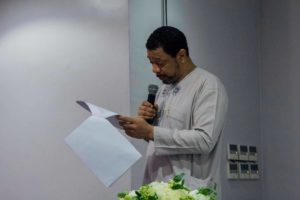
Dr. Olaokun Soyinka delivering the keynote speech titled “The Right to Freedom of Assembly and Association: An Inalienable Human Right.
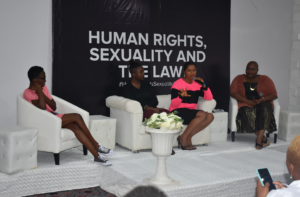
Panelists – Olutimehin Adegbeye, Eloghosa Osunde and Emmanuella David-Ette – discussing the Erasure and Underrepresentation of Women in the Queer Narrative. The discussion was moderated by Wana Udobang.
Sexual Health and Capacity Building
Under our sexual health programme, we worked on improving access to comprehensive health care services by sexual minorities in Lagos and the environs. We also held capacity building sessions for members of the LGBTI community.
- In 2018, we facilitated the training of ten volunteers who were then engaged as Peer Educators to reach their respective peers with basic information about HIV/AIDS prevention, human rights SOGIE based violence and interpersonal skills for the implementation of Behavioural change communication (BCC) activities. A total of 405 peers were reached through these peer educators.
- We also conducted training for eleven volunteers to equip them with the required skills to act as community mobilizers and train them on the target population to be reached. The trained volunteers were then engaged as Community mobilizers for HIV Testing Service outreaches at their respective localities.
- We conducted four mass sensitization exercises on sexual health. Our curriculum covered STIs, HIV/ AIDS, HIV screening, the proper use of condoms and lubricants, human rights etc. We reached a total of 142 people and their sexual partners.
- HIV testing services were conducted year-round both at our wellness center and on-field during sensitization exercises for a total of 2070 individuals. We provided appropriate referrals to all patients diagnosed with STIs and/or HIV to healthcare facilities for further care.
- We distributed commodities, including male and female condoms & water-based lubricants, to promote safer sex practice. A total of 47,161 male condoms, 1,269 female condoms, and 76,830 water-based lubricants were distributed throughout 2018.
- PrEP, PEP, and ARVs were administered to individuals respectively based on their health needs at our Wellness center. Presently, our wellness center provides intensive treatment for over one hundred individuals.
- We held quarterly Life Skills Development sessions for a total of sixty community members to build their capacity on goal setting, decision making, self-esteem, value clarification, negotiation, and refusal skills.
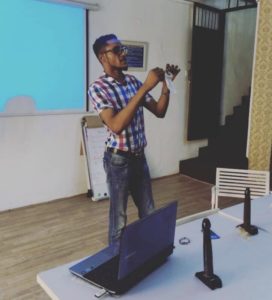
Our Director of Sexual Health and Well-Being, Akan Edet Udo, facilitating a sensitization exercise on sexual health.
Security Protection
With our new Director of Safety and Security on board, we kicked off security training for community members and partner organizations.
- In 2018, our toll-free lines for reporting human rights violations based on sexual orientation and gender identity or expression remained open. Our team was available to take calls in a confidential manner at no cost to the caller, on weekdays. The numbers are 0800 2255 84377 or 0800CALLTIERS.
- We also have lines available 24 hours where persons in distress can reach our paralegals for immediate assistance. The numbers are 070 9000 8000 and 081 4633 7128.
- We facilitated digital security training and device assessment sessions for a partner NGO in Lagos.
- In November, we conducted security training for community members, covering physical and digital security.
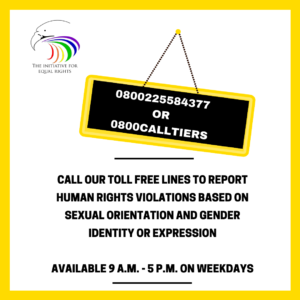
Our Toll Free Lines
Story Telling and the Media
We use storytelling and the media as a tool to engage and educate the public on issues relating to LGBT persons in Nigeria. Our Media projects in 2018 included a book publication, a YouTube talk show, a photo documentary, and a full-length feature film.
- In April, TIERs in collaboration with Cassava Republic published the ground-breaking book titled “She Called Me Woman: Nigeria’s Queer Women Speak”. She Called Me Woman is a collection of 25 first-hand narratives from queer women in Nigeria from a different class, ethnic, religious and geographical backgrounds. The collection as edited by Azeenarh Mohammed, Chitra Nagarajan, and Rafeeat Aliyu. The stories cover an array of experiences – the joy and excitement of first love, the agony of lost love and betrayal, the sometimes-fraught relationship between sexuality and spirituality, addiction and suicide, childhood games and laughter. The book sheds light on how Nigerian queer women, despite their differences, attempt to build a life together in a climate of fear. The book received rave reviews locally and internationally and was selected as one of ChannelsTV books of 2018. It is available in Nigeria and worldwide on most bookselling platforms. You can also order directly from the publishers here.
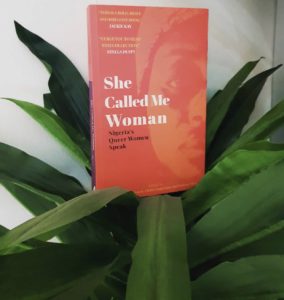
The Cover of ‘She Called Me Woman: Nigeria’s Queer Women Speak’
- In May, the third season of ‘Untold Facts’ began airing. Untold Facts is an online discussion series on LGBT rights and issues. The season hosted by Arit Okpo, sought to demystify perceptions of LGBT persons in Nigeria while discussing issues relating to internalized homophobia, depression and abuse of the minority by the minority and by the public at large. We hosted several guests including Peter Kass, Amanda Iheme, and Doctor Kevin Okoli, who had informed views on the various topics. You can watch the full season on our youtube channel.
- In October, our much-anticipated full-length movie “We Don’t Live Here Anymore” was premiered. Directed by Tope Oshin, the film tells the story of two teenage boys who become the center of unwanted attention because of their sexual orientation. It leads the audience through an emotional and nuanced journey of two families upon the knowledge of their children’s sexual orientation. The movie mirrors the typical Nigerian society and shows how the two different families come to terms with their love and acceptance for their children. They are forced to confront “taboo” issues and navigate their realities at home, school, and in the society, at large. We Don’t Live Here Anymore became the most nominated movie at the Best of Nollywood Awards, receiving 9 nominations including Movie of the Year, and Movie with the Best Social Message. It cinched the awards for Movie of the Year, Best Director, Best movie editing, and Most Promising Actor. You can watch the trailer here. The movie is available for streaming worldwide on www.myfilmhouse.ng.
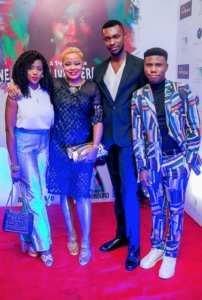
Elma Mbadiwe, Tope Oshin, Francis Sule and Temidayo Akinboro at the premier of We Don’t Live Here Anymore
- In December, we worked with a few community members to create the “Human, Not Number: Lived Experiences of Sexual Minorities in Nigeria” photo documentary. This project is directed at getting people to understand that LGBTQI persons are human beings who deserve to walk the streets of their county without fear of harassment, discrimination, violence or in extreme cases, death. With this photo documentary, we aim to humanize the realities and lives of the victims of such violations and encourage others to humanize LGBTQI persons. Copies of the photo documentary have been distributed, and are still available at our centers. You can view a digital copy here.
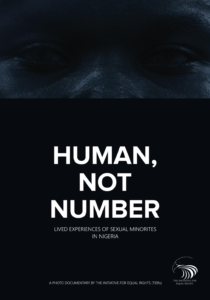
Cover of “Human Not Number: Lived Experiences of Sexual Minorities in Nigeria”
In the coming months, we will continue with all our projects that defend and stand up for the rights of LGBTI people. A few of these projects include releasing our biennial poll on the perception of LGBTQI+ people in Nigeria, facilitating holistic security trainings for our partner organizations, training and deployment of paralegals across Nigeria and in some other African countries, kicking off the Strategic Litigation and Movement Building project, facilitating more Sexual Health and Capacity Building trainings for community members, and interesting media projects like the fourth season of Untold Facts.
However, we are kicking off this year with our first human rights symposium in Abuja this Friday, 8th February. If you are in Abuja or its environs, please reply to this email or send us a message on any of our social media platform, Facebook, Twitter or Instagram, to RSVP and get event details.

Prepare to be encouraged, challenged and inspired by the work of our incredible community.
Sincerely,
Xeenarh Mohammed
Executive Director, The Initiative for Equal Rights (TIERs) Høyde Dexnex
This Post Has One Comment
Comments are closed.


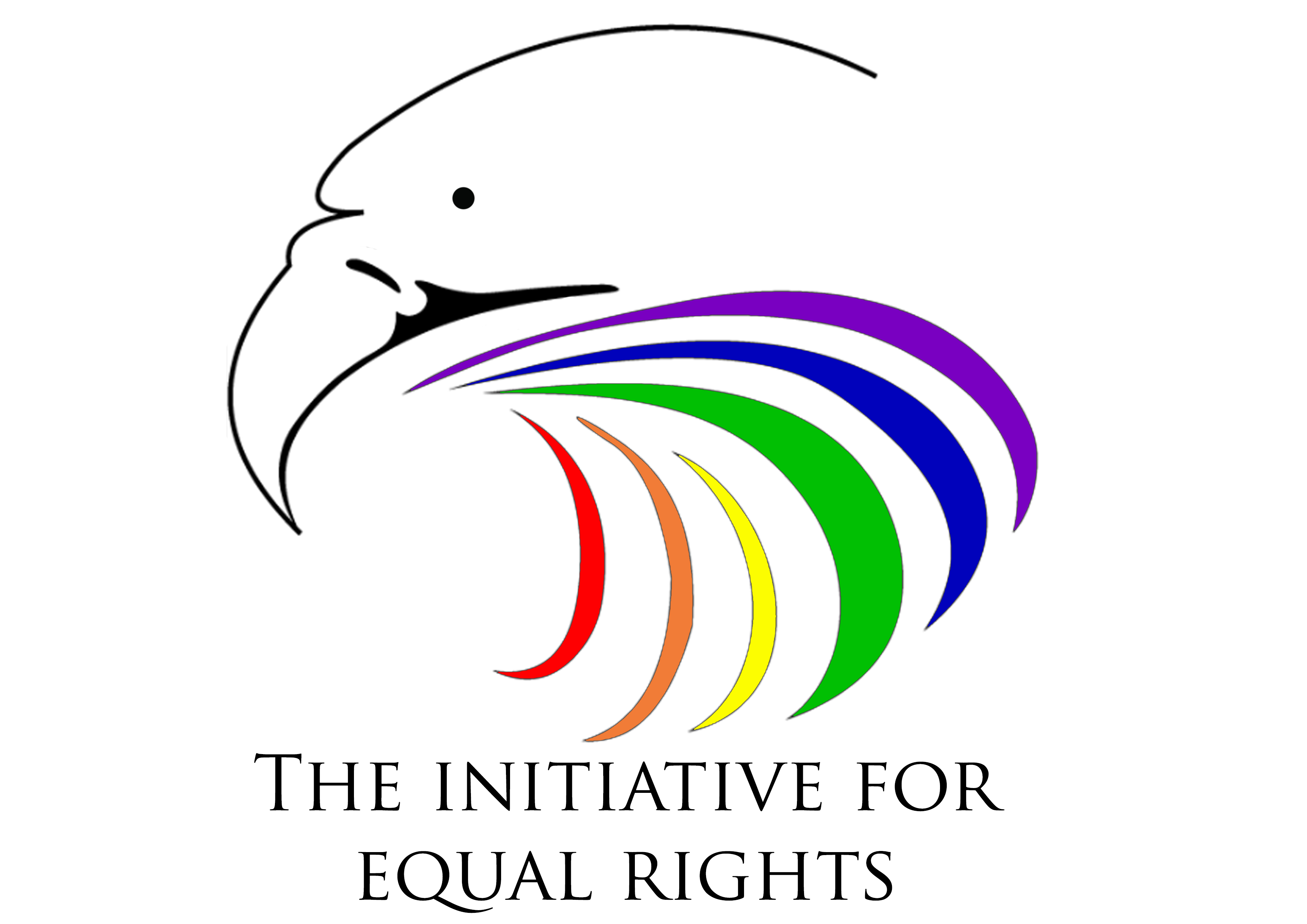
Good work!.. I would love to be a part of this organization..